So far this month in our increasingly inaccurately named Masculinity Mondays, we've looked at one particular example of Arab-American masculinity. We talked about Abed from the popular sitcom Community, and how his character was identified as Arab-American but his culture was never considered enough a part of the character to make part of the story. As a result, he read as a white-washed idea of what an Arab-American man "ought" to be.
Well, this week we're going to look at a variation on that same theme, another character who is identified more by his intellect than by his race. This time, however, the effect is very different, based entirely on the complexity of the character in question and the setting of the show. I am talking, of course, about Dr. Julian Bashir on Star Trek: Deep Space Nine. That's right, chickadees, we're going vintage nerd on this one.
So for those of you who only dimly recall Deep Space Nine or think I'm lying and this must not be a Star Trek show at all, allow me to explain. Deep Space Nine was a spinoff of sorts on the Star Trek franchise. Occurring concurrently with Star Trek: The Next Generation, Deep Space Nine broke the general show model and did not take place on a starship, let alone the Starship Enterprise. Instead, the show takes place almost entirely on a space station, Deep Space Nine, to be precise.
 Since it's not a show about a ship traveling through space, the format of the show becomes pretty different. It's less military, with the Federation only making up the command structure of the station and plenty of characters who just happened to live there and were unaffiliated. The stories weren't about them going places (most of the time), but instead about various aliens and problems coming to the station. There were longer running story arcs too, the results of a singular location and sprawling cast, and in general while the show doesn't feel like classic Star Trek, it's really good science fiction.
Since it's not a show about a ship traveling through space, the format of the show becomes pretty different. It's less military, with the Federation only making up the command structure of the station and plenty of characters who just happened to live there and were unaffiliated. The stories weren't about them going places (most of the time), but instead about various aliens and problems coming to the station. There were longer running story arcs too, the results of a singular location and sprawling cast, and in general while the show doesn't feel like classic Star Trek, it's really good science fiction.It also stood out, however, in the diversity of the cast. Following the Star Trek example, Deep Space Nine features a racially and gender diverse cast of really interesting and complex characters. Also aliens. Of these characters, one of the most fascinating and also hardest to pin down is Dr. Julian Bashir (Alexander Siddig/Siddig El Fadil), a brilliant medical prodigy who just so happens to be a man of Arab descent. Hence why we're talking about him today.
Dr. Bashir is, like I said, a fascinating character but one that's hard to define. A gifted doctor and valued member of the Deep Space Nine command structure, he's also very young for his role and sometimes comes off as deeply immature. He's incredibly good at pretty much everything he does, but he's also plagued with self-doubt and there's an entire episode devoted to his question of whether or not he's a quitter. He's deeply moral and ethical, but also not afraid to do the drastic things required to save lives. In other words, he's exactly as complex as a good character should be, and I hate that this is surprising.
In a lot of ways, Dr. Bashir's racial background doesn't factor into his character much at all. While it is acknowledged by the show - the character was originally set to be Hispanic and was rewritten upon Siddig's casting - it's not a big plot point. Now, ordinarily this might bother me. A de-facto whitewashing, if you will. A way for the show to have a diverse cast without having to deal with the actual issues that people of color face. That, however, does not seem to be the case here. This is Star Trek - there's a different playing field.
Because Star Trek takes place far in the future in a world where humans have got their shit together and moved past petty discriminations based on race, gender, and sexuality*, in a lot of ways there's no reason to talk about race on Star Trek. In fact, that was one of the great hallmarks of the original series. Uhura and Sulu were equal members of the crew and no mention was ever made of them not being white. It just plain wasn't a part of that universe and that had a profound impact on society.
So in a textual sense, it doesn't matter that Dr. Julian Bashir is a doctor who just so happens to be a man of Arab descent. But in a cultural sense it really really does, just like it mattered that Uhura was a black woman giving orders to white men on the original series. It matters because Deep Space Nine is, through this casting, representing a better world that doesn't yet exist, where race isn't an issue anymore.
This setup, then, makes it so that Dr. Bashir's racial background both is and is not important to an understanding of him as a character. It's not, because it pretty much never comes up as a story point and no one ever even implies that Bashir's race is an issue. And it is because Julian Bashir is one of the most positive and nuanced representations of Arab-descended masculinity you can find in American culture.
He's incredibly brilliant, a doctor so skilled that he could choose any position he wanted in the entire Starfleet. He's also incredibly idealistic: when given that choice, he picked the space station that was furthest from any other Starfleet bases because he wanted to experience real "frontier medicine and culture". He's a dork who plays James Bond games in his spare time and has no game with women, but he's also a very gifted athlete who could have been a pro tennis player if he hadn't worried about how his parents would react.
Julian Bashir is complex but not complex in that artificial way we so often see with characters of color. He's not secretly conflicted or hiding a tragic backstory (sort of). He's not deep and dark and dangerous. He's dorky. He's what the kids these days would call a "cinnamon roll". He's very professional when at work and a huge nerd when he's not. And he's the sort of ruthlessly ethical person to insist on trying to give medical assistance to their enemies even when they are actively at war.
He's the sort to risk his own life to save everyone else's. He's a damn good doctor and a damn good man and yet he's also a precious lamb who grumbles about turning thirty and like pulp mystery novels and spy stories. He's complicated in an incredibly human way.
Which is not to say that there aren't still problems.
I found it very funny watching the Bashir-centric episodes of Deep Space Nine to prepare for this article (I do research because I am also a nerd). In the 90s, when the episodes were actually airing, Bashir was not particularly popular. His listing in the title credits of the show dropped from second to somewhere like fifth or sixth in the first couple of seasons of the show. I found it hilarious because, well, if Deep Space Nine were airing today, people would be all over Bashir. He's adorable and also sexy sometimes, very smart and very good and highly competent. But in the 90s, nerds were still worthy of ridicule, and Bashir is very much a square.
As a result, Bashir wasn't a super popular character and the writers of Deep Space Nine tried a couple of times to sex him up or change his backstory to make him more appealing. The actor, Alexander Siddig**, vehemently objected to these changes, even going so far as to actively sabotage some of them.
When it was revealed that Dr. Bashir's intelligence and athletic ability came from a series of illegal genetic experiments he underwent as a child, Siddig was annoyed that the writers were trying to turn his character into a version of Data from The Next Generation. He refused to go along and eventually the character's personality was returned to its previous parameters.
Personally, I have mixed feelings about the "Bashir is secretly genetically modified" storyline. On the one hand, it was a rather compelling piece of storytelling and created some very good episodes of television. And there's something appealing in the idea of a man of color being an example of the "genetic ideal" - sort of like why Noonien Singh Khan was such a big deal.
On the other hand, I find it problematic that the writers felt the need to explain away Bashir's accomplishments this way. Because we find out eventually that Bashir is genetically enhanced, we are implicitly told that his achievements - his skill at tennis and darts, his excellent memory, his fantastic medical abilities - are the result of these experiments. Julian Bashir himself isn't special, his modifications have made him special. Which is problematic because it's taking the one Arab-descended character on the show and sort of dismissing everything he's done as something he couldn't have achieved without external help. It detracts.
But even with this story point in mind, Dr. Julian Bashir is still the most complex and overwhelmingly positive representation of Arab-descended masculinity that I can think of on American television, and a lot of that comes down to volume and audience.
There are 173 episodes of Deep Space Nine, and Bashir is in (or credited in) all of them. He's one of the most consistent presences on the show and said show ran from 1993 to 1999, reaching an audience of millions during an age where television genuinely was shaping the popular culture. For a lot of people, consciously or not, Bashir is the Arab-descended character they know best, a man who appeared on a family friendly show and who always represented the logical and compassionate perspective, who believed very strongly in a code of ethics, and who openly exemplified the best that humanity has to offer. That's kind of a huge deal.
I sometimes wonder what would have been different if Deep Space Nine had still been on the air in the early 2000s when America made its sudden shift into rampant Islamophobia and distrust for Arab-American citizens, particularly the men. Would Bashir's presence on a beloved show like this have made a difference? I don't know.
What I do know is that for the time the show was on and to anyone who wants to hop on Netflix and discover it all over again, Dr. Bashir gives a nuanced, complex, and heart-felt image of what it means to be a good man, who just happens to be of Arab descent, in the 24th century. Science fiction has always had the potential to change the world for the better - it's nice to see a show actually taking that responsibility seriously.
Also, and this is just a side note, I found it very satisfying to see a character so gifted at math and science and medicine identified as Arab-descended. Arabic culture is, after all, responsible for many of the mathematic and scientific principles upon which we based our entire culture. Arabic culture had the first great universities and libraries, great achievements in medicine, and is responsible for our simple and fantastic mathematic system. So having a brilliant doctor just so happen to be Arab-descended is pretty neat.
We all want better representation in our television shows. There is always room to do better. But even with that in mind, it's okay to look back and appreciate the good representations that have come before, cheesy and hamfisted as they sometimes are. Julian Bashir is an Arab-descended man who had nothing to prove to anyone and was his own man first and foremost. I think he deserves a little love.
**Alexander Siddig used his birth name, Siddig El Fadil, for the first season of the show or so, but found that fans and producers had a lot of trouble remembering and pronouncing it. Since an actor is very reliant on name recognition, he changed it. Chloe Bennet of Agents of SHIELD recently gave an interview where she mentioned doing the same thing, because apparently Americans are the worst about stereotyping people based on having "foreign" names. Ugh.

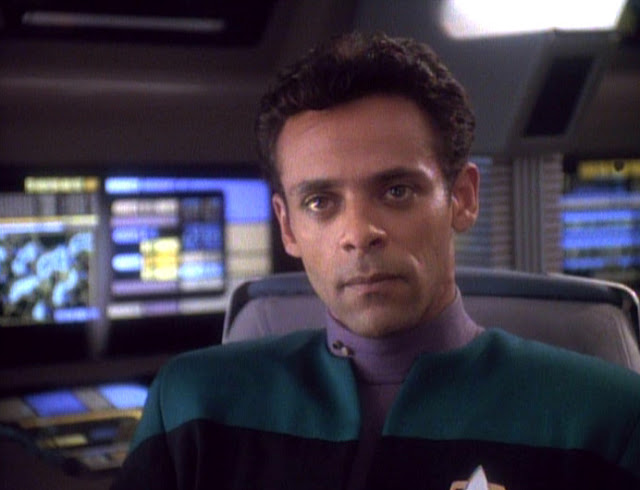
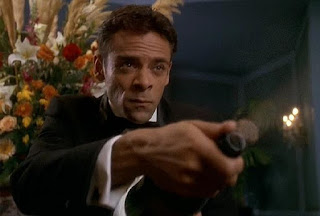
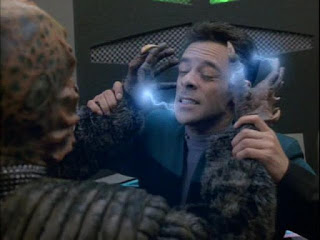
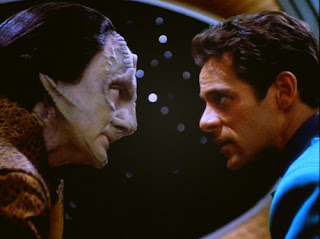

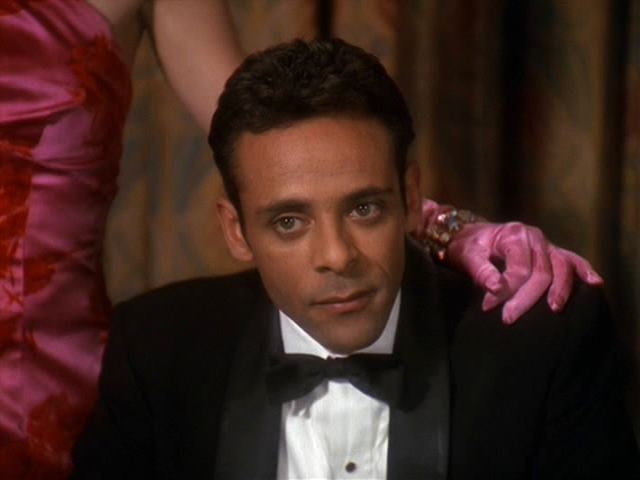
hi i really enjoy your blog its very interesting. one thing siddig's name didnt fall down the opening credits because he was unpopular. the opening credits for ds9 arn't ranked. they are done my alphabetical order and siddig changed his name from siddig El Fadil to alexander siddig which is what caused the fall
ReplyDeletehi i really enjoy your blog its very interesting. one thing siddig's name didnt fall down the opening credits because he was unpopular. the opening credits for ds9 arn't ranked. they are done my alphabetical order and siddig changed his name from siddig El Fadil to alexander siddig which is what caused the fall
ReplyDeleteI love this post! Well done. I also really appreciate Dr. Bashir as a complex human being and a good man; I loved that he would have driven me nuts in real life but was still truly ethical and a terrific doctor. As to the genetic enhancement thing - it bugged me. I blogged about it. It didn't change him in essence, and that's why Kukalaka meant so much to him.
ReplyDeleteOh - hann-g, above, is right. The change in the credits had nothing to do with the doctor's popularity; it was a result of his name change.
One thing I loved about the Bashir/ethnicity (lack of) theme: Sisko is very aware of how his ancestors were treated in the 20th/21st century (and is uncomfortable roleplaying holodec scenarios from that time). Bashir doesn't seem to care, and expresses no such discomfort. But when both Bashir and Sisko go back to the actual 21st century US in Future Tense, they are both immediately picked up by the police and put in the prison-like Sanctuary District, whereas the (apparantly) white Dax gets picked up by a wealthy white man and treated with respect. The police don't care that he is a future doctor from a post-racist world - he is a non-white dude sleeping rough, and thus a valid target for abuse. I feel like that was the DS9 writers way of showing that Bashir's race is not irrelevant to the message of the show, and even if Bashir himself does not assign it any significance.
ReplyDelete(Maybe you were referring to this by putting that photo of Sisko and Bashir in Sanctuary? Sorry if you mentioned this and I missed it)
bengali escort service kolkata
ReplyDeletebest escort girls contact in kolkata
busty indian housewives escort kolkata
cheap escort service kolkata
escort girl kolkata ph number
escort service shyam bazar phone number kolkata
high profile escort service in kolkata
hot kolkata escort
hotels available escort service at kolkata
indian girls escort kolkata
indian girls escort kolkata for tuor bankok
kolkata airhostess escort
FEMALE CALL GIRLS KOLKATA
ReplyDeleteFEMALE CALL GIRLS
SEXY CALL GIRLS SERVICE IN KOLKATA
ESCORTS SERVICE IN KOLKATA
KOLKATA FEMALE ESCORT SERVICE
TOP ESCORTS SERVICE KOLKATA
BEST KOLKATA ESCORTS SERVICE
CALL GIRLS SERVICE
ESCORTS SERVICE
ESCORT SERVICE
ESCORTS SERVICE IN KOLKATA
BENGOLI ESCORTS GIRLS
BENGOLI CALL GIRLS KOLKATA
KOLKATA ESCORTS SERVICE
FREE ESCORTS SERVICE KOLKATA
FREE WHATSAAP NUMBER ESCORTS
FREE WHATSAAP NUMBER OF CALL GIRLS
PHONE NUMBER OF ESCORTS SERVICE
FREE PHONE NUMBER ESCORTS SERVICE
MOBILE NUMBER OF ESCORTS SERVICE